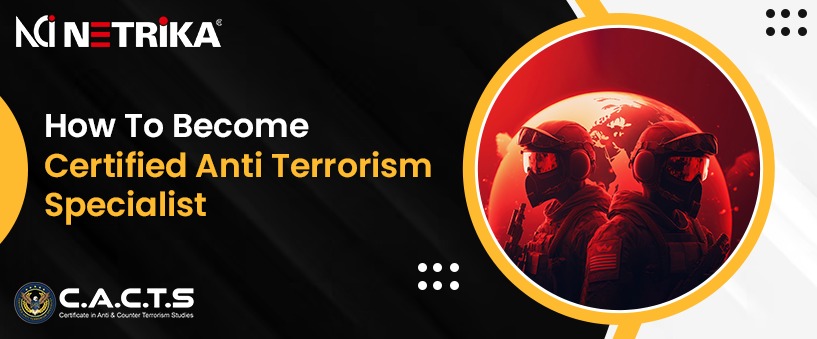
How To Become Certified Anti Terrorism Specialist
Counter-Terrorism: building a career
With numerous industrial verticals available in both the private and public sectors, pursuing and establishing a career as a counter-terrorism analyst is no longer a difficult undertaking. Enrolling in a certified anti-terrorism specialist course, on the other hand, is an excellent strategy to carve one’s profession while getting the necessary methodological and technological understanding.
The certificate in anti-terrorism and counter-terrorism course is designed to prepare students for the certificate in anti-terrorism curriculum. The course outlines the intelligence community’s goal and function, as well as the core principles of intelligence analytic tactics. It combines essential issues with a look at modern international terrorism and counter-terrorism measures.
The anti-terrorism certificate also discusses the nature, roots, evolution, objectives, methods, and organization of terrorism and terrorist groups, as well as the differences between terrorism and other types of political violence. It discusses why people turn to terrorism, the role of terrorism in bigger international conflicts, and the emergence of terrorism in many parts of the world.
Skills and education required to become a certified anti-terrorism expert
The education requirements for counterterrorism jobs vary according on the organisation. A bachelor’s or master’s degree in international affairs, national security studies, or an equivalent topic is almost certainly required for a qualified anti-terrorism specialist working for intelligence services, for example. Other positions may demand a bachelor’s or master’s degree in criminal justice or a degree in analytics.
A qualified anti-terrorism professional must have the following skills.
- Jobs in counter-terrorism require a wide range of skills, including data analytics. To assess risks and understand crime and demography, for example, professionals must be able to analyse and utilise data.
- Knowledge of data visualisation is also important, for example, knowing how to depict complex data sets so that policymakers and others can act quickly on the data.
- Professionals in counterterrorism must also be good communicators. Working with many levels of government, such as state police, local police, and the governor’s office, is a task that everyone in the industry encounters. Certified anti-terrorism professionals must be able to interact effectively across multiple agencies.
- Certified anti-terrorism professionals must have sharp critical thinking abilities, great interpersonal skills, the ability to think creatively, as well as data analytics, data visualisation, and communication skills.
Recognising the critical role that rule of law and fundamental human rights play in counterterrorism operations, the anti-terrorism certificate course seeks to provide a valuable and relevant resource. The course seeks to strengthen applicants’ understanding of terrorism, its impacts, and related concerns by providing them with a comprehensive understanding of relevant international, regional, and national instruments and approaches. The online CAT courses aim to improve applicant performance by connecting theory to practise, encouraging critical thinking, and employing cutting-edge interactive teaching tactics such as experiential learning, case studies, and group projects.
Netrika’s anti-terrorism certificate course
Terrorism continues to represent a serious danger to global peace and security, affecting the people and economies of many UN member states. Within the framework provided by universal instruments, security council resolutions, and global counter-terrorism policy, many challenges and methods can be applied to counter-terrorism actions at the global, regional, and national levels.
CACTS and Netrika collaborated to develop the trained Anti-Terrorism Specialist (CACTS) course given by Netrika in order to establish a fleet of trained anti-terrorism specialists who are more vigilant and prepared. The comprehensive curriculum of the anti-terrorism certification in India acquaints students with the risks and challenges confronting international security, which is based on genuine case studies and counterforces. Netrika’s thorough and value-added CACTS training improves understanding of terrorist threat identification and pattern trends.

